Leading economy in the region on the back of wide sector activities
- Diversified non-commodity reliant economy with consistently high GDP growth across the last decade.
Investment-led GDP growth
- Development of large public infrastructure programmes backed by multilateral international funding driving potential GDP growth.
- Infrastructure expenditures averaged 6.8% of GDP in 2019-2025, with public investment set to continue supporting growth in the medium run.
- Following a 9.7% expansion in 2024, the Georgian economy sustained its growth momentum with preliminary growth of 7.5% y-o-y in 2025.
Low inflation with 3% target set from 2018 by National Bank of Georgia
- After two years of below target levels, price pressures re-emerged in 2025, mainly driven by rising food prices, pushing inflation above the target from March onward, with the annual average inflation standing at 3.9% in 2025. Core inflation, which excludes the most volatile items such as food, energy and regulated tariffs, averaged 2.4%, indicating relatively stable underlying price dynamics. The National Bank of Georgia has kept the monetary policy rate steady at 8.0% since May 2024.

